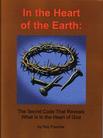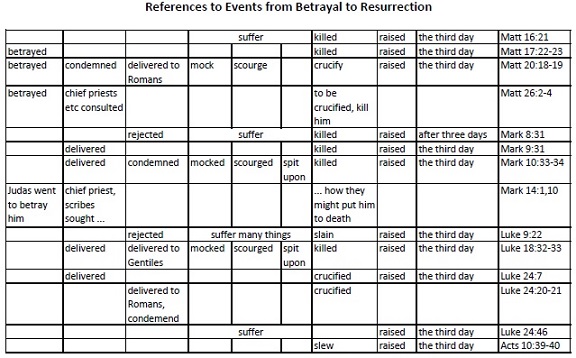 |
 |
 |
Luke 24:21 Explained Introduction The scenario presented in the book In the Heart of the Earth: The Secret Code That Reveals What Is In the Heart of God gives evidence for a Friday afternoon crucifixion and a resurrection just a few hours after Jesus' death. The next day, two of the disciples were conversing on their walk to the town of Emmaus. When Jesus joined them and asked what they were talking about, their reply included an interesting statement: "But we trusted that it had been he which should have redeemed Israel: and beside all this, to day is the third day since these things were done." (Luke 24:21) The verse would seem to be a problem because it was spoken the same day as Jesus' resurrection and, quite possibly, about 24 hours after His death (in this scenario) yet it clearly includes that event. This study will examine this verse. There is so much evidence for the early Sabbath resurrection that there must be a way this verse can be reasonably reconciled with that scenario. Context Here is the context; the verses leading up to the verse in question: "13 And, behold, two of them went that same day to a village called Emmaus, which was from Jerusalem about threescore furlongs. Notice how many references there are to these "things." The question is what is meant by these "things"? It would be the events of the previous few days. The passage itself includes references to Jesus being delivered by the rulers and condemned - events which happened before His death; certainly not the same day as His resurrection. There are quite a number of verses that cover events from the betrayal to the resurrection and the time span of those events was actually about three days. Here are the references to the events from the initial betrayal to the resurrection:  When Was the Betrayal? This is covered in detail on pages 22-24 of the book In the Heart of the Earth: The Secret Code That Reveals What Is In the Heart of God. Clearly, the betrayal and the whole series of events began on Tuesday evening. Anointing Immediately before the betrayal is the account of Mary anointing Jesus for His burial. "For in that she hath poured this ointment on my body, she did it for my burial." (Matt 26:12) Mary wouldn't have known about Jesus' impending death. Not many days before she likely heard (at least her sister did) Jesus say: "... I am the resurrection, and the life: he that believeth in me, though he were dead, yet shall he live:" (John 11:25) Having likely heard this - if not directly, then from Martha - and considering Jesus - at that moment - was an honored guest at dinner the thought that He was soon to die would likely be far from her mind. It was probable that the Spirit moved on her to do what she did and thus it was, in a sense, an act of heaven more than an act of Mary. Immediately after the anointing Judas left the dinner to initiate the betrayal: "Then one of the twelve, called Judas Iscariot, went unto the chief priests," (Matt 26:14) At the same time in fact the priests were consulting and hatching their plot. The timing of Judas' arrival was probably perfect. "But the chief priests consulted that they might put Lazarus also to death;" (John 12:10) This point of the anointing may well have marked the beginning of the period of three days and three nights - the time that Jesus would be "in the heart of the earth" - in the minds of evil men to control and, ultimately, kill Him. The Third Day Since A key phrase in the verse in question is "to day is the third day since these things were done." If the "these things" can reasonably be understood to include everything from the initial betrayal, then the timing can be understood like this:  The events in this series started on what we would call Tuesday evening which, being after sunset, actually belongs to Wednesday. So with "these things" beginning on Wednesday, Thursday would be the first day since the start of the events, Friday would be the second day since and Sabbath would be the third day since these things were done. And so, the verse in question can be seen to easily fit with the theory of a resurrection on the seventh-day Sabbath. Extra Material Word Meanings Here are the various translations for the words used in the verse. The verse is given here with Strong's numbers and the number of occurrences of the various words used to translate (in the King James Version) the Greek behind each word. This is taken from the On-line Bible software. But we trusted that it had been he which should have redeemed Israel: and It can be seen from the above, that there is enough variability in many of the word meanings that there could possibly be an alternate to the standard understanding of what it means. For example, the word "is" was translated from a Greek word that was not once translated as "is" in 71 uses except for this single case. And there is another Greek word ("esti," Strong's G2076) commonly translates as "is" that could have been used. Verses that refer to "these things" or "many things." "From that time forth began Jesus to shew unto his disciples, how that he must go unto Jerusalem, and suffer many things of the elders and chief priests and scribes, and be killed, and be raised again the third day." (Matt 16:21) |
Prophecy Newsletter
Receive
free newsletters
reporting and analysing world events related to prophecy.
The Greek has multiple words for forgiveness? God forgives (charizomai) whether we ask or not. Receiving forgiveness (apheimi) is by our choice.
God always forgives!
|
|
|
|
||
|
| ||

New! Comments
Have your say about what you just read! Please leave a comment below.